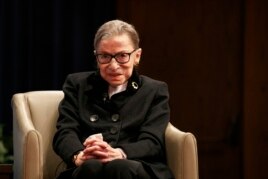25 July 2020
At the age 87, Ruth Bader Ginsburg is the oldest justice of the United States Supreme Court. She is also one of its longest-serving and most liberal members.
Last week, Ginsburg, who has survived cancer, worried her many supporters with the announcement that her cancer has returned.
"Everybody is checking their phones daily to see what Justice Ginsburg[‘s] health situation is," said Russell Wheeler. He is an expert at the Brookings Institution, a Washington policy and research center.
Ginsberg was appointed by former Democratic President Bill Clinton in 1993. She said she has no plans to retire. But her supporters fear a court opening would permit President Donald Trump, a Republican, to appoint another conservative judge.

Supreme Court Justice Ruth Bader Ginsberg attends Georgetown Law's second annual Ruth Bader Ginsburg Lecture, Oct. 30, 2019, in Washington.
The Supreme Court's future
The Supreme Court's decisions usually have a strong effect on every part of American life.
Just this year, the court said that U.S. law protects gay and transgendered from workplace discrimination. It said employers can deny birth control health coverage to female workers based on religious belief. And it ruled that "no citizen, not even the President," in this case, could refuse to produce evidence for a state's criminal hearing.
Justices in the United States Supreme Court are nominated by the president. After Senate confirmation, they can serve for life but some choose to leave early.
Ginsburg is not the only older Supreme Court justice likely to retire. Liberal justice Stephen Breyer, another Clinton appointee, is 81. Republican-appointed conservative justices Clarence Thomas, at 72, and Samuel A. Alito Jr., at 70, are nearing retirement age.
The court now has five conservative and four liberal members. Two of its conservative justices – Neil Gorsuch and Brett Kavanaugh – were appointed by Trump.
In 2016, the Republican-controlled Senate refused to consider a nomination to the Supreme Court from President Barack Obama, a Democrat. As a campaigning move, Republican candidate Donald Trump released the names of conservatives who he would nominate to the court. Some conservative voters noted the move as a reason they voted for Trump.
With at least one or more court openings possible, liberals are now hoping to make the Supreme Court's future an issue in the November presidential election in 2020.
A group of liberal organizations has started buying $2 million worth of advertising in Arizona, Michigan, North Carolina, Pennsylvania, and Wisconsin. These are the important states that could decide who becomes the next president.
"Donald Trump has hijacked our Supreme Court with far-right justices like Brett Kavanaugh," the project's first ad says, adding that Kavanaugh may serve for many more years.
Courtney Parella is a Trump campaign spokeswoman. She defended the president's record of appointing "solid, conservative" federal judges.
"The president's record appeals to conservatives who supported him in 2016, appointing judges that will faithfully uphold the Constitution," Parella said.
While agreeing that the Nov. 3 election will likely be decided by two issues, the coronavirus and the economy, Democrats say voters have begun to understand the importance of the Supreme Court. And there is some evidence of that.
In April, a poll by Suffolk University and USA Today found that more Democrats than Republicans view the Supreme Court as a top issue.
Yet the campaign of Democratic presidential candidate Joe Biden has not made the Supreme Court a campaign issue. The Biden campaign did not respond to several requests for comment.
I'm Susan Shand.
VOA's Masood Farivar reported this story. Susan Shand adapted it for Learning English. Hai Do was the editor.
________________________________________________________________
Words in This Story
gay - adj. a homosexual
transgendered - adj. one who changes the sex of birth to the other sex
hijack – v. to take over
faithfully - adj. with devotion
uphold - v. to maintain or to respect
poll – n. a group of questions used to determine possible voting outcomes